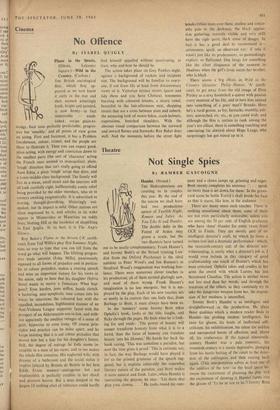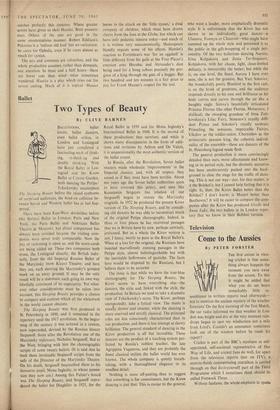Theatre
Not Single Spies
By BAMBER
GASCOIGNE
THE Shakespearians are courting us in couples this year. By the end of the season we shall have had two productions apiece of Twelfth Night, Romeo and Juliet, As You Like It and Hamlet. The double daily in the Forest of Arden may prove a strain, but the two Hamlets have turned out to be neatly complementary; Frank Hauser's and Jeremy Brett's at the Strand (visiting Lon- don from the Oxford Playhouse) is the ideal antidote to Peter Wood's and Ian Bannen's at Stratford. Wood's imagination was working free- lance. There were numerous clever touches in his production; all of them seemed glaringly new, and most of them wrong. Frank Hauser's imagination is no less energetic, but it is em- ployed by the play. Each of his new touches sits so neatly in its context that one feels that, from Burbage to Brett, it must always have been so.
In the 'nunnery' scene Jeremy Brett takes Ophelia's book, looks at the title, laughs, and flicks through the pages. He finds what he is look- ing for and reads: `The power of beauty will sooner transform honesty from what it is to a bawd, than the force of honesty can translate beauty into his likeness.' He hands her back the book saying, 'This was sometime a paradox, but now the time gives it proof.' This is certainly not, in fact, the way Burbage would have played it (or so the printed grammar of the speech sug- gests), but it exploits admirably the somewhat literary nature of the paradox, and Brett makes it seem natural and fresh. Later„ when Hamlet is instructing the players, he says: 'Let them that play your clowns. . . .' He looks round the corn- pany and a clown jumps up, grinning and eager. Brett sternly completes his sentence :`. . . speak no more than is set down for them.' In the grave- yard scene he holds Yorick's skull beside his face so that it stares, like him, at the audience.
There are many more such touches. There is nothing sensational about them; some of them are not even particularly noticeable, unless you are among the 50 per cent. of English graduates who have 'done' Hamlet for every exam from GCE to Finals. They are merely part of an intelligent director's craft, by which he turns a written text into a dramatic performance—which, the twentieth-century cult of the director not- withstanding. is surely what a director's job is. I would even include in this category of good craftsmanship one touch of Hauser% which has been criticised. Ophelia takes and cradles in her arms the sword with which Laertes has just threatened Claudius. The action is neither more nor less mad than her words; and through the reactions of the others, as they cautiously try to take the dangerous weapon from her, the impres- sion of her madness is intensified.
Jeremy Brett's Hamlet is as intelligent and straightforward as the production. He plays those qualities which a modern reader finds in Hamlet—his probing student intelligence, his taste for gloom, his bouts of ineffectual self- criticism, his exhibitionism, his talent for sudden and unexpected bursts of affection, and, above all, his exuberance. Jf the typical nineteenth- century Hamlet was a pale romantic, the twentieth-century is a manic depressive, plunging from his hectic baiting of the court to the dejec- tion of the soliloquies and then soaring back again. (This interpretation solves at least one of the oddities of the text—in the brief space be- tween the excitement of planning the play and the excitement of showing it, Hamlet lapses into the gloom of `To be or not to be.') Jeremy Brett catches perfectly this creature. Where greater actors have given us their Hamlet, Brett presents ours. Others of the cast are good in the same unostentatious manner. Robert Eddison's Polonius is a 'tedious old fool' but no caricature; he cares for Ophelia, even if he cares almost as much for syntax.
The sets and costumes are colourless, and the whole production assumes, rather than demands, our attention. In three and a half hours—there are fewer cuts than usual—mine sometimes wandered. Hamlet is a play which cries out for severe cutting. Much of it is topical—Hauser leaves in the attack on the 'little eyases,' a rival company of children, which must have drawn cheers from the fans at the Globe, but which can have only pedantic interest today—and much of it is written very uneconomically. Shakespeare blandly repeats some of his effects. Hamlet's reaction to Fortinbras's war `for an eggshell' is little different from his guilt at the First Player's emotion over Hecuba; and Alexander's dust being used for a bung echoes precisely the pro- gress of a king through the guts of a beggar. But two hundred and ten minutes is a fair price to pay for Frank Hauser's respect for his text.



































 Previous page
Previous page